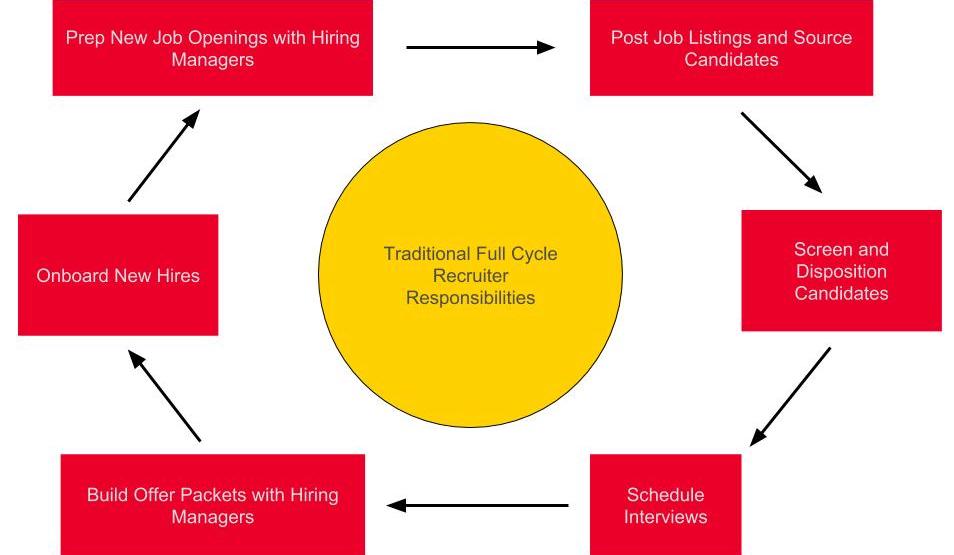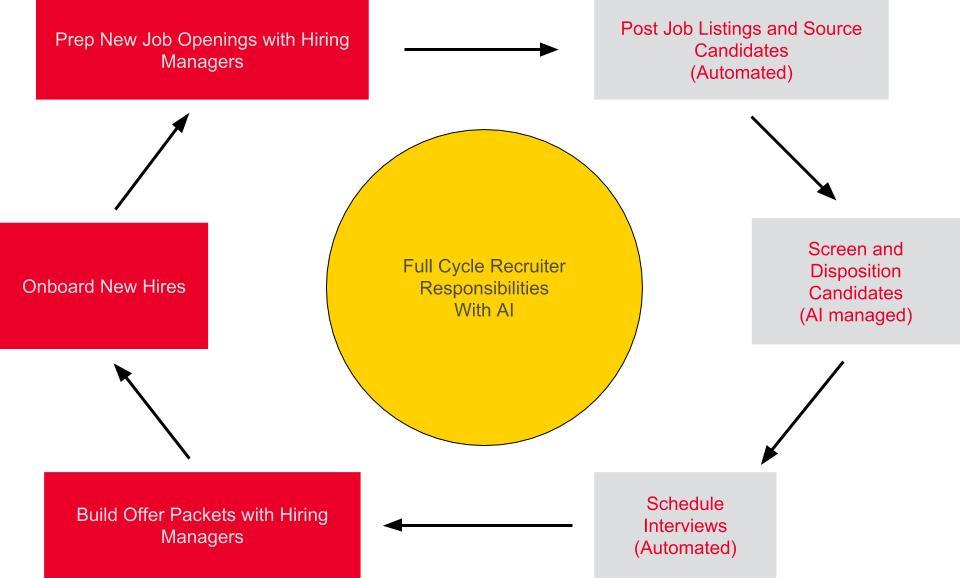Candidates: Are you interviewing and need support?
The full cycle recruiter performs valuable services for medium and small organizations, and these organizations place a high premium on their skills. These recruiters build job descriptions, convert passive candidates, screen and disposition applicants, draft offer letters, and manage onboarding. Their broad spectrum of abilities, skills, and knowledge are valuable assets to their companies.
Full cycle recruiters provide a variety of benefits to talent acquisition organizations. They work at both the tactical and strategic level for each phase of the hiring process and develop valuable skills and knowledge as a result. Among these are:
- Institutional knowledge about different departments, how they work together within an organization, and the best types of employees for each.
- Communication skills to translate talents and competencies from applicants to hiring managers and vise versa.
- Emotional intelligence to know how and when to engage candidates, particularly passive candidates.
- Interpersonal skills to work with a wide variety of different people and personalities when working with candidates and hiring managers.
Unfortunately, transactional recruiting processes — like sourcing or scheduling interviews — dominate much of their time.
New technologies in recruiting are changing this model. Recruiters now have access to automated systems to post jobs and schedule interviews. They can harness artificial intelligence to screen and disposition candidates in a fraction of the usual time. AI won’t be replacing recruiters. It will transform their role as strategic partners in the hiring process.
The Current State of Full Cycle Recruiting
This is the existing model of full cycle recruiter responsibilities. They spend almost all of their time on the transactional responsibilities of sourcing, screening, and scheduling.

This leads to problems for both large and small companies.
- Larger enterprises, who hire thousands of candidates a year, have to segment hiring and recruiting for efficiency. Instead of a single recruiter connecting candidates and hiring managers, a several recruiters split the hiring process between them and all have limited interactions with all parties.
- Small and midsize organizations have the inverse problem: several recruiters have deep interactions with only a few candidates. This limits the otherwise strong value full cycle recruiters bring to a company.
AI Makes All Recruiters Full Cycle
Now large, medium, and small organizations can achieve the benefits of full cycle recruiters without sacrificing time or relationships with candidates and hiring managers.

The new model allows recruiters to apply full cycle skills and insight to other parts of the recruiting operation, such as gathering candidate experience metrics, nurturing candidate relationships, or building employer branding content.
That’s because advances in talent acquisition solutions — video interviewing, game-based assessments, and automated sourcing technology — will cut out some of the most time-consuming tasks like screening and sourcing candidates.
Recruiters Can Use This Time for Meaningful Business Impact
Imagine how much more engaged your recruiters can be if they aren’t spending all of their time scheduling interviews, screening, and dispositioning candidates. These are a few ways recruiters can apply full cycle skills and insight after automating their most time consuming tasks.
- Coach hiring managers on what they want in their next hire With more time available each day, recruiters can build strong relationships with hiring managers to help them craft a job description that attracts the perfect candidates.
- Nurture high-potential candidates and connect them with positions Full cycle recruiters can can focus in on developing rapport with high quality candidates, giving them a great candidate experience that encourages them to accept an offer.
- Apply their broad institutional knowledge across the organization Full cycle recruiters understand the organization on a deeper level than most employees. When a team member leaves, they have a better idea of who would be the right kind of person to replace them and can spend more time advising hiring managers on ideal candidates.
- Suggest solutions and improvements to the hiring process A full cycle recruiter can analyze candidate feedback and use that feedback to identify changes and implementations that will improve the candidate experience and recruiting pipeline.
- Build an employer brand that attracts highly qualified candidates Your recruiters are on the front lines of candidate interactions and understand your employer brand’s strengths and weaknesses. A strong employer brand is linked to reduced cost-per-hire, and employers with a strong brand spend half as much on recruiting costs than those with a weak brand. Now they have the time to address those deficiencies.
Full cycle recruiters can be a powerful tool in your company, with flexibility and institutional knowledge to find the perfect candidate and contextual understanding of how every component of the recruiting process impacts the organization. Incorporating AI and other automation into your recruiting process will give recruiters the resources they need to assess and implement the best ways to improve your talent acquisition function.




